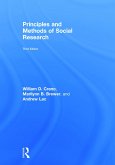Crafting Phenomenological Research, Third Edition, continues to demonstrate its award-winning quality, clearly establishing itself as the leading international resource for those interested in a concise introduction to phenomenological research in education and social sciences.
As a leading contemporary practitioner of phenomenology, Vagle walks the reader through multiple approaches to designing and implementing phenomenological research, including his post-intentional phenomenology, which incorporates elements of poststructural thinking into longstanding phenomenological methods. Vagle provides readers with methodological tools to build their own phenomenological study, addressing such issues as research design, data gathering and analysis, and writing.
Replete with exercises for students, resources for further research, and examples of completed phenomenological studies, this book affords the instructor an easy entrée into introducing phenomenology into courses on qualitative research, social theory, or educational research.
New to this edition:
A new final chapter that introduces his latest developments in post-intentional phenomenology (PIP).Updated "snapshots" and "resource digs" that provides brief commentary and/or examples to illustrate concepts and ideas, many of which draw on Vagle's latest contemplative research study.Updated discussions of important methodological concepts such as researcher reflexivity.
As a leading contemporary practitioner of phenomenology, Vagle walks the reader through multiple approaches to designing and implementing phenomenological research, including his post-intentional phenomenology, which incorporates elements of poststructural thinking into longstanding phenomenological methods. Vagle provides readers with methodological tools to build their own phenomenological study, addressing such issues as research design, data gathering and analysis, and writing.
Replete with exercises for students, resources for further research, and examples of completed phenomenological studies, this book affords the instructor an easy entrée into introducing phenomenology into courses on qualitative research, social theory, or educational research.
New to this edition:
A new final chapter that introduces his latest developments in post-intentional phenomenology (PIP).Updated "snapshots" and "resource digs" that provides brief commentary and/or examples to illustrate concepts and ideas, many of which draw on Vagle's latest contemplative research study.Updated discussions of important methodological concepts such as researcher reflexivity.









